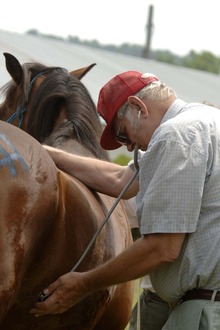Assisi Animal Health, developers of the Assisi LoopTM, a non-pharmaceutical and non-invasive healing and pain management device for animals, offers information to pet owners about the dangers of colic, the different classifications of this condition, and its causes.

Vet checking horse for colic symptoms
Assisi Animal Health, developers of the Assisi LoopTM, a non-pharmaceutical and non-invasive healing and pain management device for animals, offers information to horse owners about the dangers of colic.
Colic is a fairly common condition in horses that affects the digestive tract. The main symptom is abdominal pain, which can become excruciatingly uncomfortable. Constipation, rolling, pawing and unsteady walking â much like Wobblers â are known characteristics.
The type of colic depends on the cause, and its severity can range from mild to life-threatening. Equine caregivers should consider any suspicion of colic an emergency and seek immediate veterinary assistance.
Other symptoms of colic include depression, anxiety, not drinking, looking at the flank, sweating, appetite loss, excessive pulse rate and frequent urination. There are two types: gaseous and impaction.
When gas builds in the digestive system without release, horses are in critical danger and require emergency treatment. When there is impaction, it is extremely important to provide relief and remove the blockage from the colon.
Both types of colic result in chronic pain, which should be clearly evident by the horse's behavior. Common causes of this condition include parasites, lack of fluids, sand ingestion, benign growths inside the gut and stones in the stomach.
For early detection, every horse owner should have a stethoscope to listen to the horse's vital signs. Checking heart rate, the color of mucus membranes, gut sounds and the rate of respiration also can help with early detection.
The biggest risk with gaseous colic is that gas buildup can cause the stomach to flip, otherwise known as gastric torsion. A veterinarian may insert a nasogastric tube through the nostril and into the stomach. This will allow the vet to administer fluids, electrolytes and mineral oils directly. A belly tap may be necessary to acquire digestive fluids for further analysis. After diagnosis, the horse's caregiver and vet will discuss a treatment schedule and medications.
Assisi Animal Health's clinical solutions complete the Circle of CareTM â the collaboration of veterinarians and owners in animal health and healing. Our company helps veterinary professionals and owners improve the quality of life for companion animals using the Assisi Loop, the non-invasive, non-pharmaceutical healing device that is based on the same FDA-cleared technology used on humans. The device uses low-level pulses of electromagnetic energy to reduce pain and swelling, and to enhance recovery.
For more information, visit the Assisi Animal Health website: http://www.assisianimalhealth.com/.
